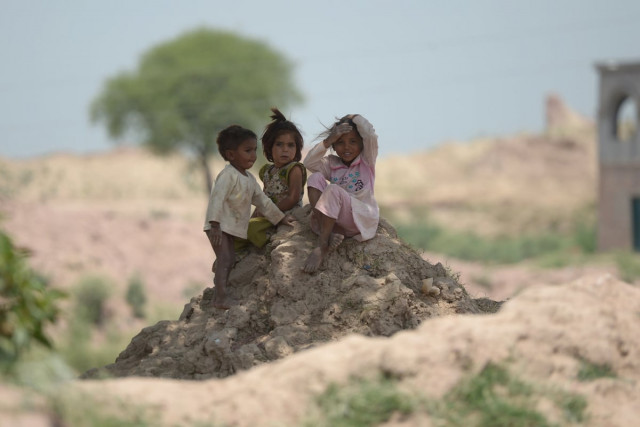Tackling malnutrition: New guidelines framed to cope with emergency-like situation
Expert says sustainable political, financial backing vital to improve nutrition

Expert says sustainable political, financial backing vital to improve nutrition. PHOTO: AFP
The government has formulated ‘revised national guidelines’ on community-based management of acute malnutrition (CMAM) to help improve children and women’s health.
The Ministry of National Health Services, Regulations, and Coordination (NHSRC) has shared the guidelines with the provinces.
Lack of substantial investment and political will, and poor capacity of provinces have hampered the past initiatives to tackle high malnutrition rates.
The ministry’s Nutrition Wing Director Dr Baseer Achakzai said the earlier guidelines, which were formulated after the 2005 earthquake, have been revised with the support from UN agencies to overcome the emergency-like situation in the country, especially in Tharparkar, Sindh.
He said the guidelines will help improve early case detection, referral and case management, and will reduce the number of acutely malnourished children.
The ministry also plans to integrate the revised CMAM into routine health services for children under five years and pregnant and lactating women, and also to scale up CMAM across the country.
Achakzai added that Pakistan has some of the worst health and nutrition indicators in South Asia with higher prevalence of child malnutrition than in neighbouring countries.
The National Nutrition Survey (NNS) 2011 painted a gloomy picture of nutritional status of children in the country which, according to the survey, had worsened during the last decade instead of improving.
Stunting rate among children rose from 41.6 per cent in 2001 to 43.7 per cent in 2011. Similarly, the trend of wasting increased from 14.3 per cent to 15 per cent in the ten years in review. Underweight rates remained constant at 31.5 per cent during the decade.
Despite damning figures, the country has no comprehensive plan to address the issue of malnutrition at the national level. A senior official at the health ministry, who wished not to be named, said successive governments have lacked the will to invest in nutrition programmes.
Planning Minister Ahsan Iqbal and State Minister for NHSRC Saira Afzal Tarar had announced to set up a national task force to eradicate malnutrition but no progress has been made on the issue so far.
The official said the issue requires an integrated public health approach and funds. “Even the ongoing drought in Tharparkar, which has claimed over 1,300 lives so far, did not jolt the government to come up with a sustainable plan to improve nutrition,” they said.
Malnutrition in Pakistan contributes to high morbidity among pregnant and lactating women and morbidity and mortality among children under five, the official added.
Published in The Express Tribune, January 6th, 2014.



















COMMENTS
Comments are moderated and generally will be posted if they are on-topic and not abusive.
For more information, please see our Comments FAQ